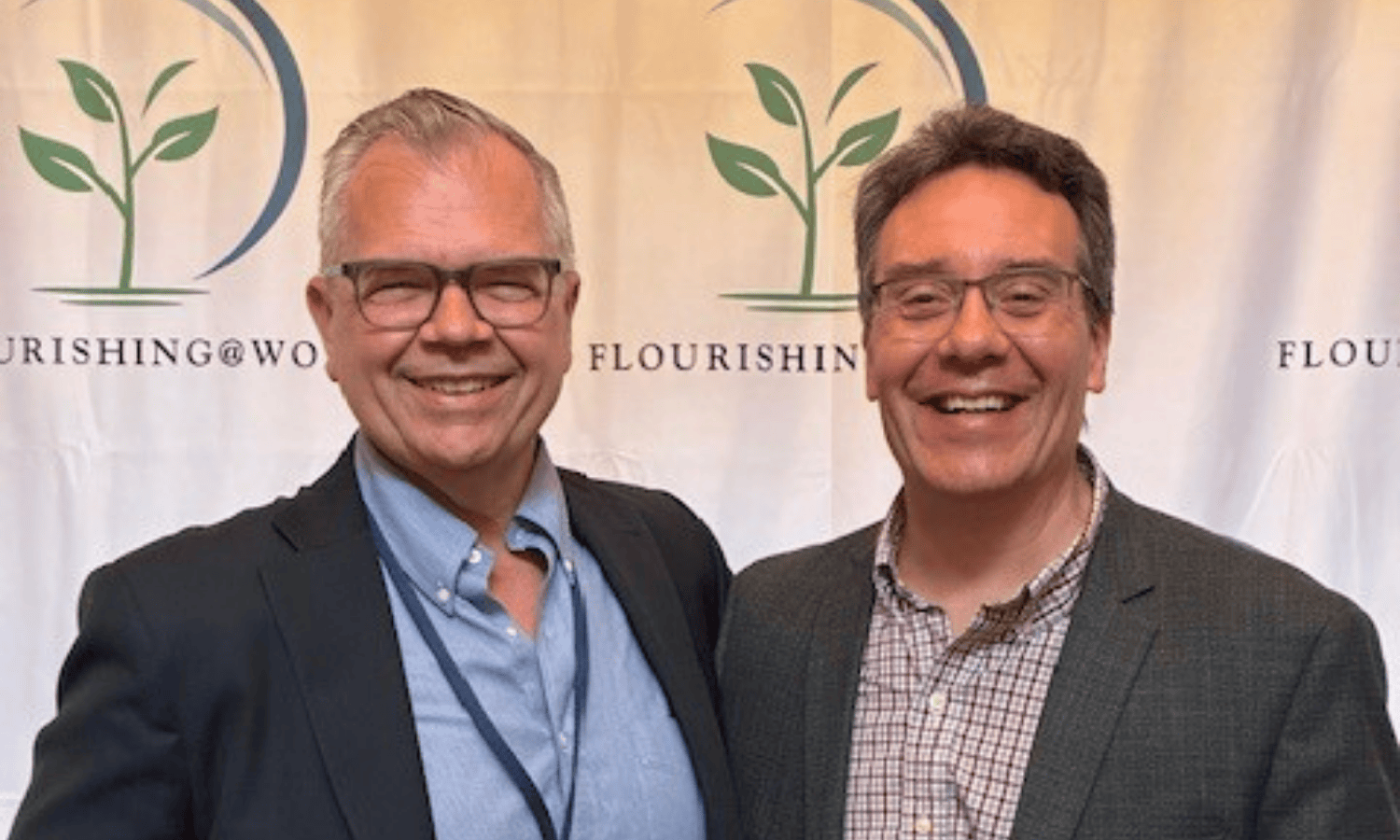 CAMBRIDGE, MA, USA - The Harvard Flourishing at Work Summit on May 2nd highlighted the importance of human flourishing to business leaders, with presentations by thought leaders such as Dr. Tyler VanderWeele and Dr. Matthew T. Lee, both of the Human Flourishing Program (HFH), Institute for Quantitative Social Science at Harvard.
CAMBRIDGE, MA, USA - The Harvard Flourishing at Work Summit on May 2nd highlighted the importance of human flourishing to business leaders, with presentations by thought leaders such as Dr. Tyler VanderWeele and Dr. Matthew T. Lee, both of the Human Flourishing Program (HFH), Institute for Quantitative Social Science at Harvard.
Rick Goossen (ELO) and Matthew T. Lee (HFH)
They addressed how flourishing in the workplace can be transformative for businesses, impacting both culture and profits! Further, DEI is on the decline; flourishing is gaining momentum.
Tyler VanderWeele, Director, Human Flourishing Program,spoke on “The Business Case for Flourishing: Caring for People and Relationships.” His comments were based on the recently published “Global Flourishing Study” of 200,000 individuals.
The principal thesis of VanderWeele’s presentation: by caring for people and for relationships, and promoting their flourishing, the business ends of a company are also promoted.
VanderWeele explained that the promotion of flourishing people and relationships is consonant with business outcomes:
- Well-being and work outcomes
- Well-being and turnover
- Well-being, healthcare and other costs
What can be done in the workplace?
- Measure well being
- Improving flourishing in life
- Improve flourishing at work
- Management approaches to improving well-being
- Creating a flourishing culture
Matthew F. Lee, Director, Human Flourishing Program, was also one of the key speakers for the day. Matt has collaborated with ELO in the past as he led a Leadership Expert Webinar previously. He is also tabbed as a speaker at an upcoming ELO Forum and as an adjunct instructor in the ELO Oxford Leadership Program.
Lee spoke on: “Appreciative Inquiry, Generative Dialogue, and Flourishing.” Lee said that from a Christian standpoint, “well-being” can be defined in terms of doing God’s will and being the face of God to others.
Lee said a good question to ask is, “What does love require?” Are you invited relationally into conversation, not into someone else’s machine? People want to be engaged in relational ways, and not in transactional ways. Business leaders need to model good relationships.
An additional presenter was Glen Comiso, Executive Director, Human Flourishing Program. He explained that human flourishing is increasingly becoming an alternative to DEI. Companies are looking for a new path. The premise of DEI is that all individuals have the right to be treated fairly and to participate fully in the workplace. Research shows that DEI programs and policies are not effective in achieving this goal.
For example, 40% of workers today feel isolated at work, despite the fact that US businesses spend nearly US$8 billion each year on DEI training (McKinsey & Co).
Creating a culture of belonging is key to engagement and organizational success. When people feel as though they’re accepted and part of something, they’re more willing to support one another and the goals of the organization. Human flourishing emphasizes themes of close social relationship, meaning, purpose, life satisfaction, character, and virtue which are more likely to address the core needs of belonging and meaning.
Given the current cultural and political environment, many organizations across industry, academia, and government are seeking a path forward that will give rise to a new, comprehensive framework for human flourishing at the individual, institutional, and societal levels.
Human flourishing emphasizes themes of close social relationships, meaning, purpose, life satisfaction, characters and virtue which are more likely to address the core needs of belonging and mission. An opportunity to build off existing human flourishing research includes flourishing in the workplace findings; relationship and engagement; job crafting; and well-being practices.
The event is sponsored by Sovereign’s Capital and hosted by Lx Partners and the Human Flourishing Program at Harvard. ELO is one of the partners of the Human Flourishing Program.
